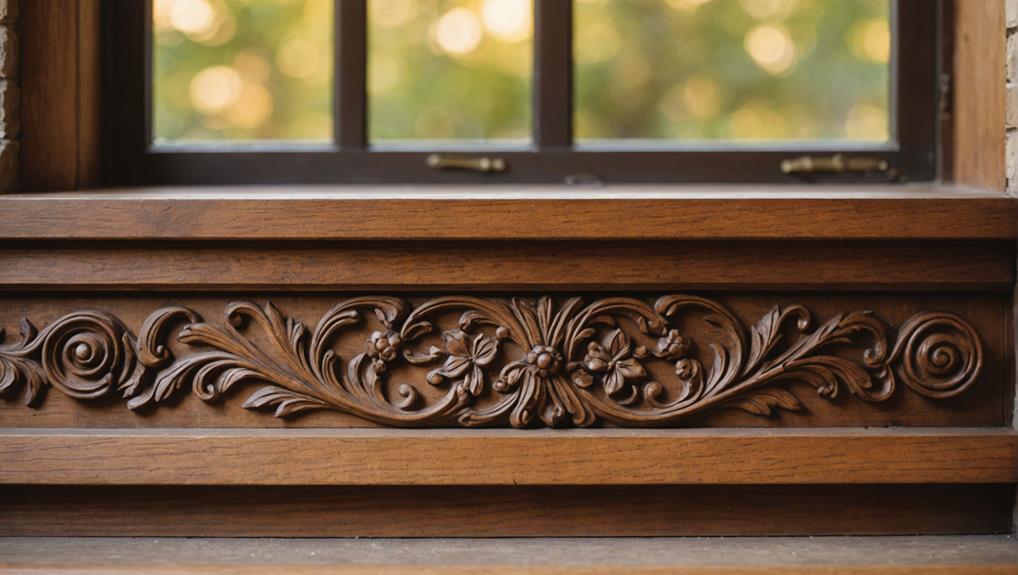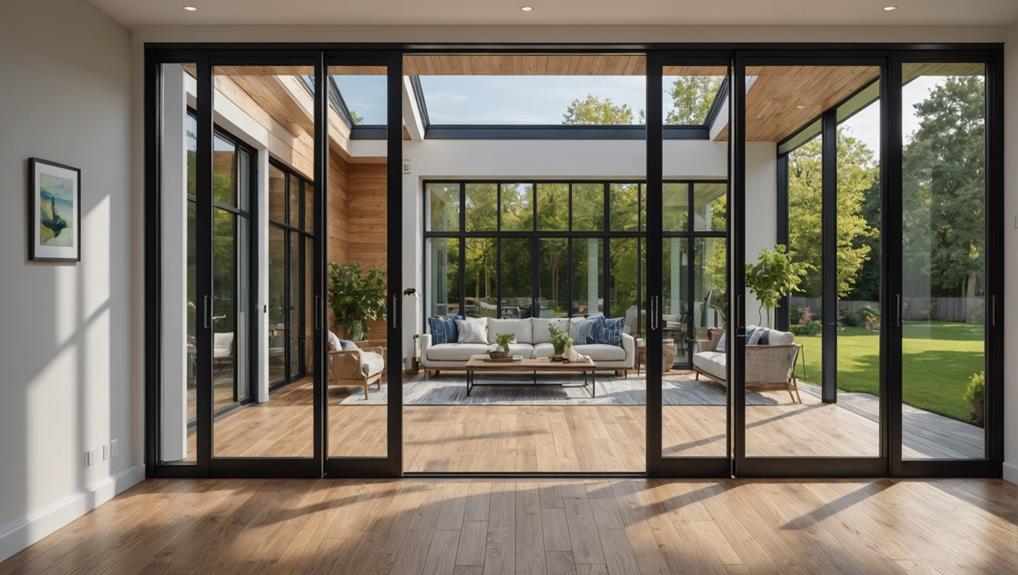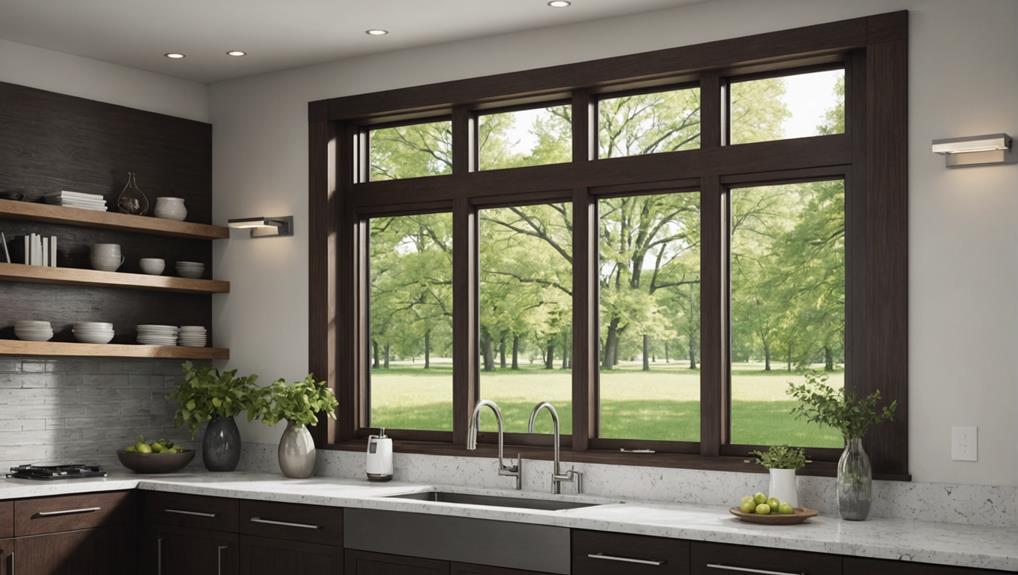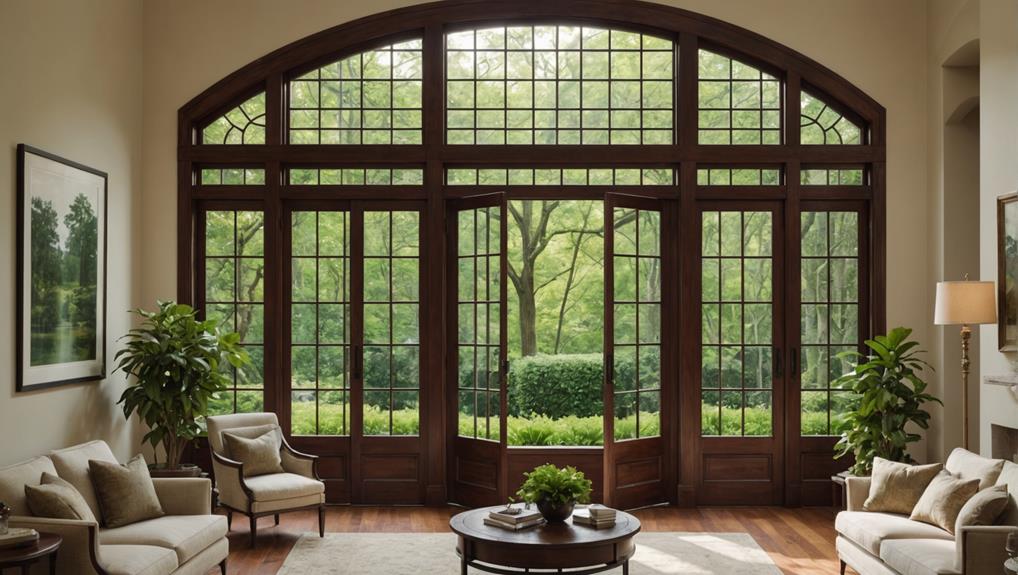When selecting materials for transom windows, consider wood, vinyl, aluminum, fiberglass, and composite options. Wood offers durability, a classic look, and good insulation, but requires maintenance. Vinyl is low-maintenance, resistant to warping, and energy-efficient. Aluminum provides strength and corrosion resistance while needing minimal upkeep. Fiberglass is incredibly durable, with impressive insulation and low maintenance needs. Finally, composite materials combine various strengths, offering customization and sustainability. Each option has unique benefits, so you’ll want to evaluate what suits your needs best. Keep exploring to discover even more about enhancing your transom window choices.
Wood for Transom Windows

When choosing wood for transom windows, you’ll find it not only enhances aesthetics but also provides durability and insulation. The right wood types can greatly impact the overall look and performance of your windows.
Popular choices include oak, mahogany, and pine. Oak offers a classic, sturdy option, while mahogany brings an elegant touch with its rich hues. Pine is more budget-friendly and can be stained or painted to match your decor.
To maintain the beauty and longevity of your wooden transom windows, follow some essential maintenance tips. First, verify regular inspections for signs of wear or damage. Look for cracks, rot, or water damage that could compromise their integrity. If you spot any issues, address them promptly to avoid further deterioration.
Additionally, apply a quality sealant or paint every few years to protect the wood from moisture and UV rays. This not only preserves the wood’s appearance but also extends its lifespan.
Vinyl Options Available
Vinyl options for transom windows offer a low-maintenance alternative to wood, combining durability with modern aesthetics. When you choose vinyl, you’re investing in a material that can withstand the elements without warping or rotting. This durability means fewer repairs and replacements over time, considerably reducing your maintenance requirements.
One of the standout features of vinyl transom windows is their energy efficiency. They’re designed with insulated frames that help minimize heat transfer, keeping your home comfortable year-round while lowering energy bills. You won’t have to worry about drafts or excessive heat loss, making vinyl an excellent choice for energy-conscious homeowners.
Additionally, vinyl comes in various colors and styles, allowing you to customize the look of your transom windows to fit your home’s design. Plus, cleaning is a breeze—just a simple wash with soap and water is all you need to keep them looking fresh.
Aluminum Benefits

Aluminum transom windows provide a strong, lightweight option that excels in both durability and style, making them a popular choice for modern homes. When you consider aluminum for your transom windows, you’re opting for a material that requires minimal maintenance and offers numerous benefits.
- Durable: Aluminum resists corrosion, ensuring a longer lifespan.
- Energy Efficiency: With proper insulation, aluminum frames can considerably reduce energy costs.
- Low Maintenance: A simple wash is all it takes to keep them looking great.
- Versatile Design: Available in various colors and finishes to complement your home’s aesthetic.
Incorporating aluminum transom windows into your home not only enhances its visual appeal but also contributes positively to energy efficiency.
You won’t have to worry much about upkeep, allowing you to enjoy the beauty and benefits without the hassle.
Whether you’re looking for sleek modern designs or classic finishes, aluminum offers the flexibility and performance you need for a stunning transom window solution.
Fiberglass Durability
Fiberglass transom windows offer exceptional durability, standing up to harsh weather conditions without warping or cracking. Unlike wood or aluminum, fiberglass maintains its structural integrity over time, making it an excellent choice for homeowners seeking longevity. You won’t have to worry about expansion or contraction, which often leads to gaps or leaks in other materials.
These windows also boast impressive insulation properties. The inherent strength of fiberglass minimizes heat transfer, helping keep your home comfortable year-round. This energy efficiency can lead to reduced heating and cooling costs, making fiberglass a smart investment.
When it comes to maintenance requirements, fiberglass is a winner. You won’t need to sand, paint, or stain your windows regularly, as fiberglass resists fading and is easy to clean. A simple soap and water solution will suffice to keep them looking fresh.
Composite Material Advantages

Composite materials bring together the best features of various substances, resulting in transom windows that are both lightweight and incredibly strong. When choosing composite materials for your transom windows, you’ll find several advantages that stand out. Here are some key points to reflect on:
- Durability: Composite materials resist weathering and corrosion, ensuring longevity.
- Energy Efficiency: They offer excellent insulation, helping to regulate indoor temperatures and reduce energy costs.
- Aesthetic Versatility: You can customize finishes to match your home’s style, giving you plenty of design options.
- Sustainability: Many composites are made from recycled materials, addressing sustainability concerns while minimizing environmental impact.
Choosing composite materials for your transom windows not only enhances your home’s aesthetic appeal but also contributes to energy efficiency and sustainability. With their durability and low maintenance requirements, you can enjoy beautiful views without the hassle.


Leave a Reply